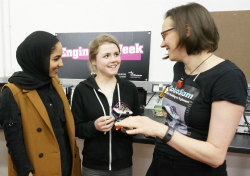Innovative teaching approach to raise the STEM profile among women and youth
Many educational and promotional initiatives at EU and national levels have attempted to boost the number of female students in engineering education and to keep as many majors as possible in such programmes of study. Results have been relatively modest, despite all the resources invested in achieving these goals. The EU-funded REESP (Re-engineering Europe's STEM pipeline) project set out to reverse this trend through training, knowledge transfer and outreach activities. Project partners gained a better understanding of the experiences and perceptions of female students in engineering education. They interviewed 47 female students enrolled in engineering and technology courses in Ireland, Poland and Portugal. This helped to address reasons women avoid STEM subjects, and what influences their decisions in joining or leaving engineering. The REESP team developed learning activities such as robot-building workshops to promote STEM among primary and second school students in order to change their perceptions and that of the general public concerning STEM disciplines and careers. The robot workshops employ problem-based learning (PBL) to engage and motivate students across all education levels. Researchers improved the learning of engineering educators to ensure they have the required knowledge and understanding of pedagogy and curriculum design. They also highlighted the role of educators in attracting and retaining a diverse engineering student population, particularly through the implementation of proven PBL methods. Proposals were made for designing a graduate degree curriculum at the Dublin Institute of Technology in the area of engineering education research for various types of master's degrees. Dissemination actions include a booth at the European Researchers' Night, STEM conference talks, and robot-building train-the-trainer programmes and workshops. REESP will contribute to the engineering shortage in Europe by providing solutions to attract and retain female students in the field, raising STEM awareness and engaging youth.



